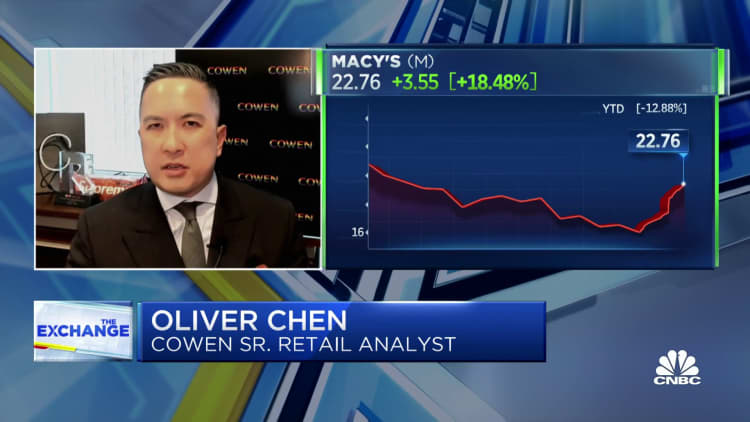Levi Strauss & Co. on Wednesday maintained its outlook for the full year and boosted its financial targets over the next five years as the denim retailer grows its e-commerce business.
The company views itself as much stronger than it was before the Covid pandemic and since its public market debut in March 2019.
"We are reaffirming full-year guidance, despite all the headwinds," Chief Financial Officer Harmit Singh said in an interview, ahead of Levi's annual investor day event. "The trends we're seeing in the business give us confidence," Singh said. "We are looking at the short term, while also not losing sight of the long term."
In recent weeks, retailers from Walmart to Abercrombie & Fitch have alluded to the challenges that they are facing, from ongoing supply chain problems and mismatched inventories, to red-hot inflation and a potential pullback in consumer spending.
Retail executives have said that lower-income shoppers are already feeling the pinch of higher prices on goods and adjusting their budgets accordingly, while wealthier households are splurging on new outfits, makeup and luggage for summer travel. The split in behavior has resulted in a similar divide in the retail industry. So far this earnings season, luxury and high-end brands — from Canada Goose to Michael Kors parent Capri Holdings — have largely outperformed businesses that cater to price-conscious consumers.
Levi doesn't expect the volatile economic backdrop will dent demand for its jeans.
It now sees annual revenue growing in a range of 6% to 8%, up from prior targets of 4% to 6%, through 2027. If achieved, that would bring Levi's revenue close to $10 billion five years from now.
For fiscal 2022, it still projects sales to increase between 11% and 13% from 2021 levels, with adjusted earnings per share falling within a range of $1.50 to $1.56. Analysts had been looking for revenue to rise 11.8%, with Levi earning a per-share adjusted profit of $1.55, according to Refinitiv data.
By 2027, Levi said it aims to expand its direct-to-consumer business to 55% of total sales and triple e-commerce revenue.
Levi's direct business accounted for about 36% of total sales in the retailer's latest fiscal year that ended Nov. 28. Digital revenue, including from wholesale partners, made up 22% of total revenue of $5.8 billion that year, according to an annual filing.
"As we continue to scale [e-commerce], that business becomes a lot more profitable," Chief Executive Officer Chip Bergh said in an interview. "Before the pandemic, our e-commerce business was a money-loser."
In addition to growing online, Levi is also pushing shoppers to buy more than just the company's iconic denim bottoms. It's aiming to nearly double revenue from tops by 2027. Levi is also projecting its women's business, which accounts for about one-third of sales currently, will double by then.
According to Singh, Levi's women's business has higher gross margins than the company's overall average gross margins.
Levi anticipates its Dockers and Beyond Yoga banners to contribute combined revenue of nearly $1 billion by 2027. Levi acquired Beyond Yoga, famous for its women's leggings and stretchy tops, for an undisclosed amount last year.
The company also announced Wednesday that its board approved the repurchase of up to $750 million in stock.
Shares of Levi are down about 28% this year.



